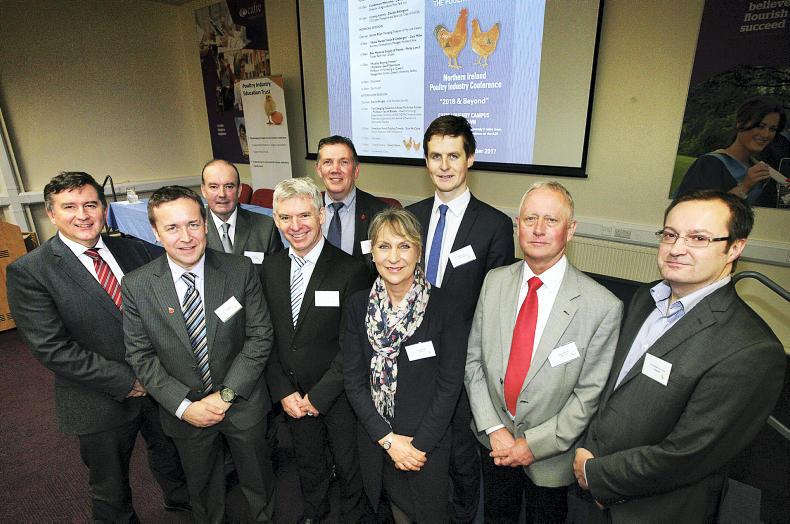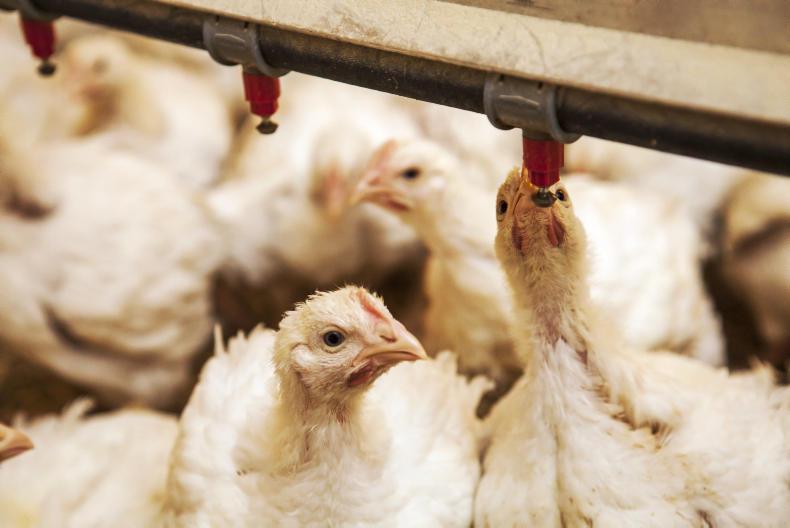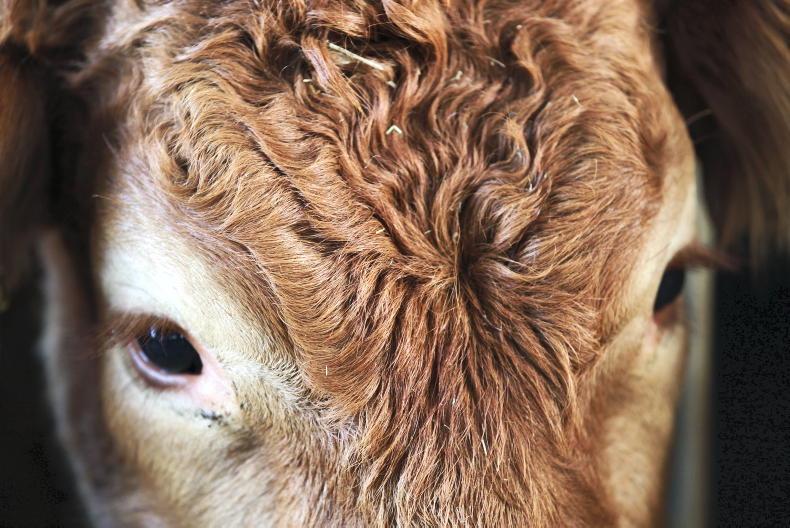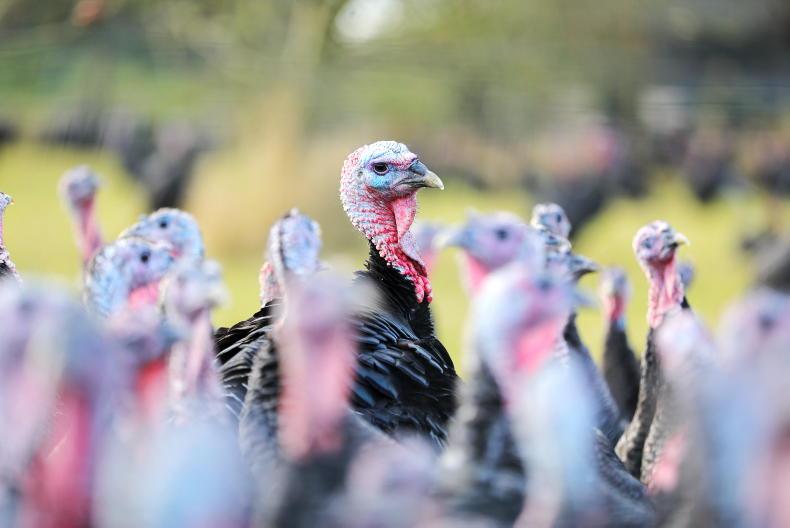Free-range poultry farmers are walking into the unknown after the Department of Agriculture extended mandatory housing of all birds until 30 April to prevent the risk of avian influenza.
For the first time, no Irish poultry products can be labelled as free range after St Patrick’s Day, the deadline for the maximum 12-week housing period allowed under EU legislation since restrictions were introduced on 23 December. According to guidelines issued by the Department of Agriculture and the Food Safety Authority of Ireland (FSAI), retail eggs face the strictest re-labelling requirements as they are the only poultry product that must display their farming method.
Free-range eggs represent around half of the Irish market. Their producers and packers must now re-register with the Department as “barn egg” suppliers and add a visible sticker to their existing packaging with the mention “Barn eggs – laid by hens temporarily housed for their welfare”.
Mullagh, Co Cavan free-range egg producer Margaret Farrelly told the Irish Farmers Journal that this solution was an improvement on earlier suggestions to redesign packaging entirely.
Yet it is far from ideal. “They are the same birds and we have extra costs,” Farrelly said, adding that stress and overeating from prolonged housing was interfering with laying hens. “We introduced hanging baskets of straw and bunches of grass so that they don’t get bored and aggressive,” she said.
Displaying the farming method is optional on eggs used as ingredients and on poultry meat, and FSAI guidelines in those cases are to remove any indication or replace the voluntary free-range labelling with the same overlay stickers as retail eggs.
Vincent Carton of Carton Brothers and Manor Farm poultry processors told the Irish Farmers Journal that the company was planning to use stickers to signal temporary housing, but would not adopt the “barn” category.
Farmers forced to re-label their free-range products face three potential risks: a consumption shift to caged poultry; a decision by retailers to stop paying the free-range premium, currently up to 35% for eggs; and replacement by products from Northern Ireland, where the housing order is being relaxed this Thursday.
“I’m appealing to consumers and supermarkets to support egg and poultry meat farmers during these unforeseen times,” said IFA poultry chair Nigel Renaghan.
“We have not seen avian influenza in any commercial flocks because of the work we do – because we have housed the birds,” he added.
There have been no reports of retailers trying to pull the free-range premium so far.
A spokesperson for SuperValu and Centra said that the stores were “100% committed to supporting Irish farmers” while complying with Department guidelines.
A Lidl representative said the company would display explanatory notices to complement overlay labelling, adding that it was “committed to honouring commercial agreements with partner suppliers”.
Margaret Farrelly said that maintaining prices was crucial in what is a small margin business. “I think the farmers would not be able to sustain a cut,” she said.
Rising temperatures are expected to end the risk of flu contagion from wild birds well within the extended restriction period.
Read more
New bird flu measures come into effect in NI
Editorial: poultry farmers can’t be victims of circumstance
Free-range poultry farmers are walking into the unknown after the Department of Agriculture extended mandatory housing of all birds until 30 April to prevent the risk of avian influenza.
For the first time, no Irish poultry products can be labelled as free range after St Patrick’s Day, the deadline for the maximum 12-week housing period allowed under EU legislation since restrictions were introduced on 23 December. According to guidelines issued by the Department of Agriculture and the Food Safety Authority of Ireland (FSAI), retail eggs face the strictest re-labelling requirements as they are the only poultry product that must display their farming method.
Free-range eggs represent around half of the Irish market. Their producers and packers must now re-register with the Department as “barn egg” suppliers and add a visible sticker to their existing packaging with the mention “Barn eggs – laid by hens temporarily housed for their welfare”.
Mullagh, Co Cavan free-range egg producer Margaret Farrelly told the Irish Farmers Journal that this solution was an improvement on earlier suggestions to redesign packaging entirely.
Yet it is far from ideal. “They are the same birds and we have extra costs,” Farrelly said, adding that stress and overeating from prolonged housing was interfering with laying hens. “We introduced hanging baskets of straw and bunches of grass so that they don’t get bored and aggressive,” she said.
Displaying the farming method is optional on eggs used as ingredients and on poultry meat, and FSAI guidelines in those cases are to remove any indication or replace the voluntary free-range labelling with the same overlay stickers as retail eggs.
Vincent Carton of Carton Brothers and Manor Farm poultry processors told the Irish Farmers Journal that the company was planning to use stickers to signal temporary housing, but would not adopt the “barn” category.
Farmers forced to re-label their free-range products face three potential risks: a consumption shift to caged poultry; a decision by retailers to stop paying the free-range premium, currently up to 35% for eggs; and replacement by products from Northern Ireland, where the housing order is being relaxed this Thursday.
“I’m appealing to consumers and supermarkets to support egg and poultry meat farmers during these unforeseen times,” said IFA poultry chair Nigel Renaghan.
“We have not seen avian influenza in any commercial flocks because of the work we do – because we have housed the birds,” he added.
There have been no reports of retailers trying to pull the free-range premium so far.
A spokesperson for SuperValu and Centra said that the stores were “100% committed to supporting Irish farmers” while complying with Department guidelines.
A Lidl representative said the company would display explanatory notices to complement overlay labelling, adding that it was “committed to honouring commercial agreements with partner suppliers”.
Margaret Farrelly said that maintaining prices was crucial in what is a small margin business. “I think the farmers would not be able to sustain a cut,” she said.
Rising temperatures are expected to end the risk of flu contagion from wild birds well within the extended restriction period.
Read more
New bird flu measures come into effect in NI
Editorial: poultry farmers can’t be victims of circumstance









SHARING OPTIONS